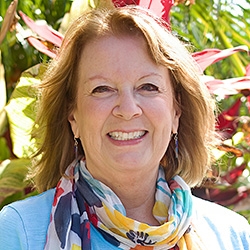
Search Results: force
-
-
-
Discover how the perennial strength of compassion and the living energy of needs can help you develop resilience in order to remain present with yourself and others amidst today's challenges.
-
- Discover how Spiral Dynamics can offer more understanding of human nature
- Learn from a Ukrainian NVC trainer and Spiral Dynamics experts
- Better grasp the evolution of human needs, values, and life conditions
- Explore how to apply NVC in situations that involve extreme violence
-
This is an opportunity to explore/transform a limiting belief you have about yourself using what science is discovering about neurobiology. A limiting belief is simply an idea or thought we have about ourselves/life that we or others have affirmed over and over again – these ideas usually get in the way of living life fully.
-
The focus on patriarchy emerges from the understanding that patriarchy plays a foundational role in everything. Yes, I mean it: everything. Patriarchy is not the same as sexism; patriarchy is to sexism very much what structural racism is to (interpersonal) racism: it's a system that runs independently of any one person's attitudes or behaviors. Join Miki for her first in a series of discussions on patriarchy.
-
Duke Duchscherer shares that community well-being is created by the relationships that exist within the community. He discerns two vital components: bonding connections within similar groups and bridging connections between different groups. This interplay forms what is commonly termed as social capital, a cornerstone of community vitality.
Duke says that a community's strength lies in its ability to foster connections across diverse backgrounds. This notion resonates deeply with him, reinforcing his commitment to utilizing restorative circles. These circles, with their focus on building and restoring relationships, hold the key to enhancing collective resilience and unity. He believes they represent a proactive approach to sustaining community cohesion and preventing fragmentation in the face of adversity.
-
Why is it so difficult to change our patterns even when we want to, even when we experience shame or despair about them? Arnina Kashtan offers some of the common pitfalls and concrete steps to overcome them in the future.
-
How can we express ourselves in a way that supports a natural flow of connection while maintaining a focus on NVC consciousness? This handout from CNVC Certified Trainer, Miki Kashtan, offers seven options that support NVC enthusiasts in evolving from classical to colloquial NVC language.
-
In a workshop, a hesitant white neurodivergent man faced a triggering reaction from a Global Majority transgender man. Uncovering their backgrounds, the facilitator addressed family dynamics and exclusion. A repair exercise fostered empathy, challenging assumptions and emphasizing the importance of equitable facilitation for a richer group experience.
-
Trainer Tip: When looking for a solution take the time to consider and connect to other's needs rather than just focusing on getting what you want. Such a basic shift in consciousness can make a profound difference in your relationships, both personal and professional. Notice how you feel afterward.
-
Living Compassion in an Ever-Changing World is the last course that Robert Gonzales offered before his passing in November of 2021. It is an intermediate course whose purpose is to deepen our conscious connection to our own vital life force, to develop skills that support inner healing, and to grow and strengthen daily practices that allow us to truly live life to the fullest.
-
- Focus on living from the inside out
- Bring a field of inner kindness to your inner distress
- Attend to your inner experience with compassion
- Cultivate an inner spaciousness of freedom
-
Working on social justice and racial equity? If you include attending to white culture and privilege as part of that work, you'll reap important benefits. Understanding white culture — along with its embedded historical privileges — provides valuable insight into a larger system of inequity.
-
What parent hasn't experienced a surge of protectiveness when your child hurts their sibling? Our cultural training calls us to immediately take two roles: the judge, determining who was wrong and what the consequences will be, and the police, enforcing the consequences. These thankless jobs often result in frustration, resentment, pain, for all. Read on for an example of how empathy transformed a child's impulse to hit another child.
-
Enjoy Dian's overview of the 4-step model and its application to the workplace. Learn how NVC can help you: generate intrinsic motivation… discover creative solutions… create greater accountability and buy-in…reinforce behaviors you like and change others… and experience a LOT more fun, joy and aliveness at work!
-
Tolerating reactivity, name-calling, blaming, guilt-tripping, or stonewalling can lead to resentment and hurt. Plus, the more you stay in a reactive dynamic, the more you are likely to reinforce the pattern. Setting life-serving boundaries around reactivity is about letting another know that you aren’t going to participate in that kinds of dynamics. This means knowing what helps with handling difficulties and asking for that.
-
Whether privileged or not, its not easy to see the humanity of others in different social locations, especially if their actions have unwanted impacts and have left behind our humanity. Aiming for “both sides hearing each other” empathically, and to focus on effect rather than intent when we have more privilege, may theoretically lead to liberation. Yet, in practice it can reinforce rather than transcend power differences -- unless there's specific ways to focus attention and choice. Here, its important to transform expectations into working with willingness, and within our own terms and timetable.
-
There's a danger in using empathy exchange to perpetually recirculate and exchange pain (often by telling and re-telling the same old stories), rather than using it as a catalyst for transformation. It can create and further pain in whatever form: anger, destructiveness, hatred, grief, emotional drama, and violence. It can also reinforce dualistic evaluations of "met" vs "unmet" needs. And it can slow down productivity.
-





















